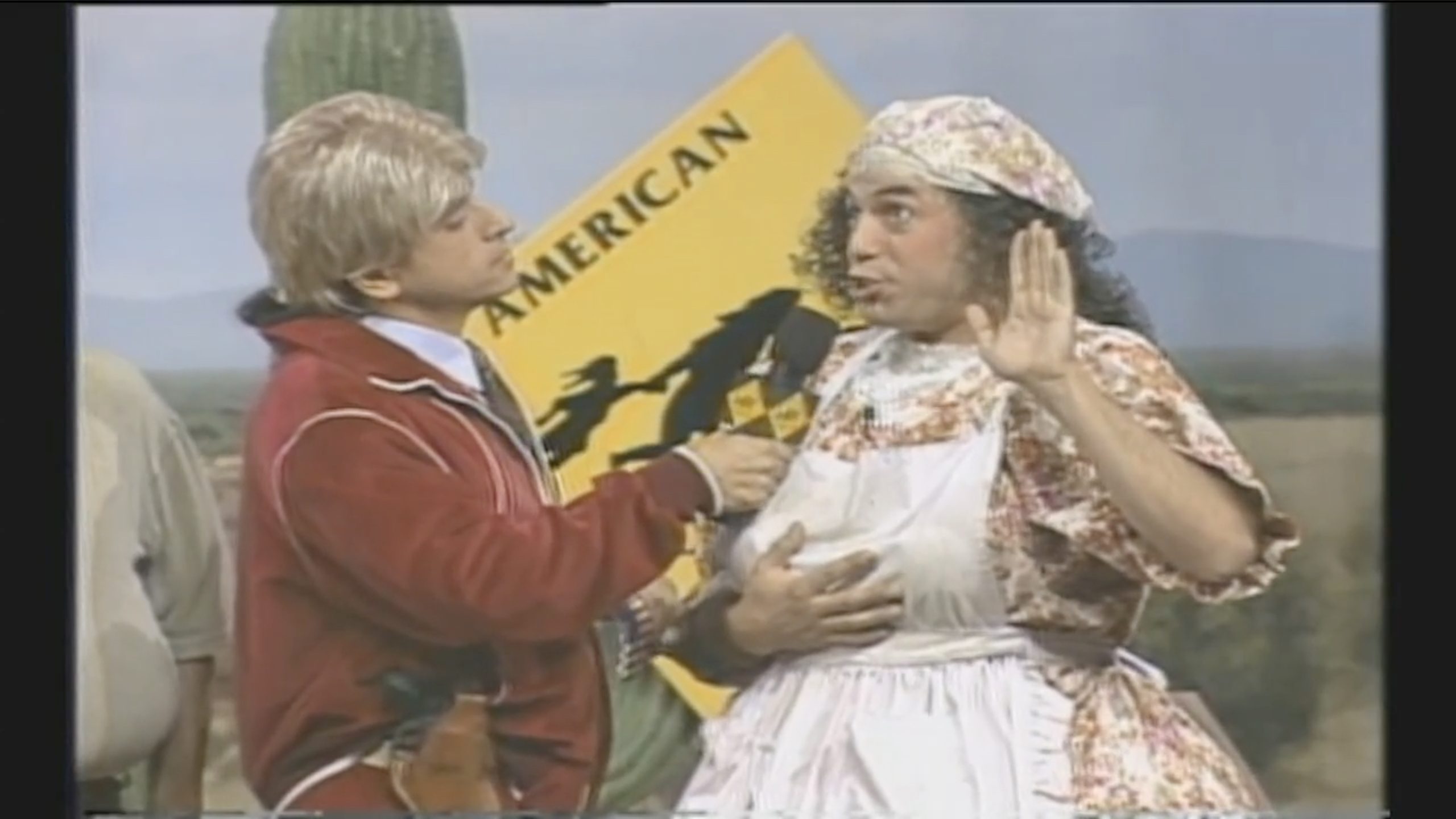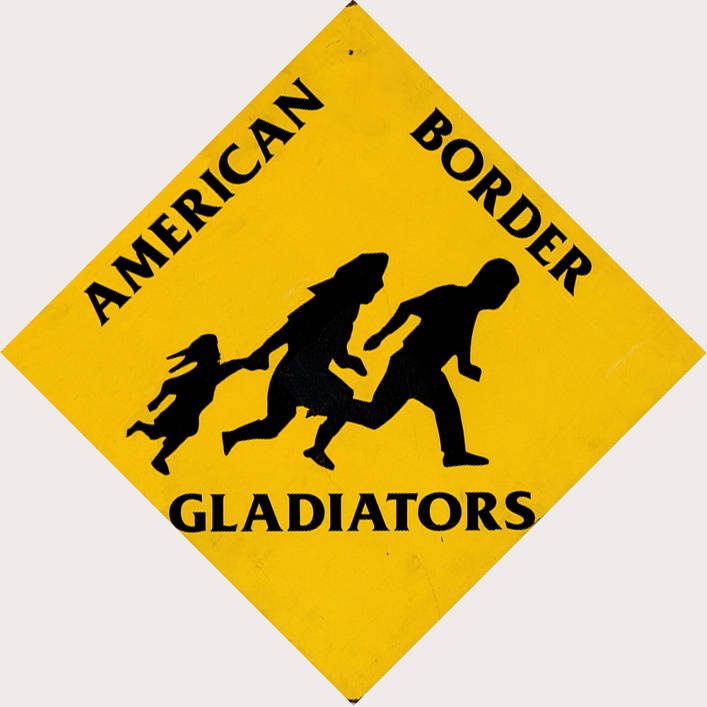
“American Border Gladiator” is a skit from the Culture Clash television show. As a parody of the show American Gladiator, which ran from the late 1980s to the mid’90s, the skit featured a competition where an average person had to complete a physical obstacle course and also overcome the trained athletes called “gladiators.” It aired on network television approximately in 1992. The central idea of “us vs. them” is crucial in this parody of the risks and potential rewards of crossing the border without authorization. In the skit’s competition, a “Green card” (American residency) was the ultimate prize. Competitors must cross the international border defended by former immigration officers. If they can cross, then they can stay. Richard Montoya is a parody of a game show host, to fit with the whole parody of the show, where the life and death stakes of immigrants are trivialized into a game. He is also the narrator and tells the audience what is happening. Herbert Sigüenza and Ric Salinas portray contestants with certain characteristics. Salinas’s character is a Salvadoran man who doesn’t speak English, and who responds “no thank you” to everything said to him. This character who has learned a key phrase in English, is polite and non-threatening, but runs a high risk in attempting to cross the international border. Doña Flora, played by Sigüenza, is a Guatemalan homemaker.Before she can even be asked anything, she recites the Pledge of Allegiance, representing another way immigrants will try to show they belong. The host then tells her that there will be time for that in a little bit. The camera then pans to the two border gladiators who are former immigration officers. After stating their names, the male gladiator says “I will not let them take your job.” When this statement is made he looks directly at the camera, breaking the fourth wall. This is a clear reference to the contemporary rhetoric of Gov. Pete Wilson and his allies. Wilson actively villanized Latinx people with his campaign against “illegal immigration.” Wilson resuscitated the false trope that immigrants steal jobs from hard-working Americans. Wilson and his political cabinet ran a commercial of migrants running across the San Ysidro border crossing. Culture Clash references Wilson’s political agenda in their skits.
The host asks him how he avoided being hit by any cars in the “Interstate Freeway 5 crossing challenge.” Rudolfo says, “No, thank you.” The host goes back to Doña Flora, and asked her how the Rio Grande rapids were. She responded with a heavy accent “Ay, sí, I lost two primos, but I managed to get through the tunnel of rats, and now I am ready for the challenge.” Then the host tells the audience that all that stands between these contestants and their green cards are the border and the border gladiators. What proceeds is an overly exaggerated confrontation by each team. The border gladiators focus on Rudolfo and pin him down. Rudolfo is saying “No, thank you” while they are doing some sort of motion with his legs. Dona Flora is about to hop a fence but just as she was reaching it, she was electrocuted; the special effects resemble a Looney Toons cartoon. Still, she is able to hop the fence and then recite the Pledge of Allegiance in front of an American Flag, and so the host then presented her with an oversize green card brought out by a Vanna White type of character. Doña Flora is asked what she is going to do next. She responds not “Disneyland. I have to go get my cousins.” She runs off the side of the stage, personifying (and making fun of) the fear that giving one migrant a green card will lead to mass migration. The host then begins his conclusion, reminding the audience that the “Pete Wilson challenge” begin next week. The skit ends on that remark.
In 1990’s California, the Republican party reproduced and amplified xenophobic rhetoric to considerable success. California Governor Pete Wilson focused on “illegal” immigrants, especially Lat

ino immigrants. In a 1994 re-election TV commercial, Wilson’s campaign argues that “illegal” immigrants are draining resources from the state. The ad begins with the ominous narrator saying, “They keep coming.” Wilson faces the Camera and promises that if elected, he will try to public services to “illegal” immigrants. Culture Clash’s skit also references another element of anti-immigrant culture in 1990s California. The famous or infamous California Highway safety sign features a man, woman, and girl running. In 1990, The California Department of Transportation began posting the sign along two busy roadways near the U.S.-Mexico border in San Diego, supposedly out of concern for the accidental pedestrian deaths that were happening, but really serving to heighten white drivers fears of undocumented immigration. Whatever effect if may have had on drivers, the graphics of the soon became iconic. Wilson was a strong advocate for Proposition 187. In the last words of the sketch, the host says “Tune in next week for the “Pete Wilson challenge.” The nature of the “competition” is unclear but it would probably be along the same lines as “American Border Gladiators” crossing the freeway during rush hour. Herbert Siguenza recalled that “It was the vilification of immigrants that was a major concern. Wilson was really making it difficult for immigrants to live and survive in California… It was very obvious that we were against Wilson and Proposition 187 while we were on TV.”
Ric Salinas explained the origin of the “American Border Gladiator” sketch. He once saw on the news a story about a truck full of immigrants in Riverside. A helicopter shot showed Border Patrol officers beating women and men. Disgusted, Salinas decided to write a skit about it, painfully aware that was one of the rare incidents that were caught on camera. The comment by Salinas illustrates how troupe members saw themselves as social commentators. They saw what was going on, and they chose to use their performance to humanize Latinx immigrants and satirize the absurd hurdles to immigration. These migrants no longer were faceless; this performance gave migrants a face and a name, and pointed out the struggles they overcame to arrive here.
California in the 1990s had an internal struggle when it came to immigration and policies associated with it. Elected officials had one view and their constituents had diverse views Culture Clash wrote “American Border Gladiator” as a direct response to the dehumanizing anti-immigrant rhetoric and policy of Gov. Pete Wilson. Propostion 187, caused Latinos to rise up and stand against the fearmongering . Culture Clash humanized Latinx immigrants while ridiculing the barriers that the U.S. has put up to needed immigration. using humor to engender understanding in audience members. This is not the only skit that Culture Clash has produced that satirize the process to enter the United States without authorization. Bernardo the Dinosaur parodies the process and expectations that Americans have for immigrants.